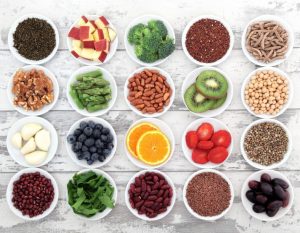
Eating a balanced diet is crucial for maintaining good health. Among the various nutrients and components, fiber plays a vital role in promoting overall well-being. Fiber is a type of carbohydrate that cannot be digested by the body and is found abundantly in plant-based foods. Including a sufficient amount of fiber in your diet can have numerous benefits for your digestive system, heart health, and weight management.
What is Fiber?
Fiber is a substance found in plant-based foods such as fruits, vegetables, whole grains, nuts, and legumes. Unlike other carbohydrates, fiber is not broken down completely by the body’s digestive enzymes during digestion. As a result, it passes relatively intact through the digestive system, providing several health benefits along the way.
The Two Types of Fiber
Fiber can be classified into two types: soluble and insoluble fiber. Soluble fiber dissolves in water and forms a gel-like substance in the digestive tract. It can be found in foods like oatmeal, apples, beans, and carrots. Insoluble fiber, on the other hand, does not dissolve in water and adds bulk to the stool, aiding in regular bowel movements. Whole wheat flour, nuts, and cauliflower are sources of insoluble fiber.
Benefits of Fiber
1. Improved Digestive Health: Fiber acts as a natural laxative, preventing constipation and promoting regular bowel movements. It adds bulk to the stool, making it easier to pass. Additionally, soluble fiber aids in regulating blood sugar levels and preventing diarrhea.
2. Weight Management: High-fiber foods tend to be more filling and can help curb hunger and control calorie intake. As a result, including fiber in your meals can contribute to weight loss and weight management.
3. Heart Health: Eating a diet rich in fiber has been associated with a reduced risk of heart disease. Soluble fiber helps lower cholesterol levels by binding to cholesterol in the intestines and preventing its absorption into the bloodstream. This, in turn, decreases the risk of developing heart-related problems.
4. Blood Sugar Control: Soluble fiber slows down the absorption of sugar, preventing rapid spikes in blood sugar levels. This is particularly beneficial for individuals with diabetes or those at risk of developing the condition.
5. Lower Risk of Certain Diseases: Adequate fiber intake has been linked to a decreased risk of several chronic diseases, including type 2 diabetes, colorectal cancer, and diverticular disease. The protective effects of fiber are believed to be due to its ability to improve digestion and promote a healthy gut.
How Much Fiber Should You Consume?
The recommended daily intake of fiber varies depending on age and gender. For adult men, it is suggested to consume around 38 grams of fiber per day, while adult women should aim for 25 grams. However, these figures may be higher or lower depending on individual needs and activity levels.
Sources of Fiber
To incorporate more fiber into your diet, it is important to include a variety of fiber-rich foods. Some examples include:
Fruits: Apples, bananas, berries, oranges
Vegetables: Broccoli, Brussels sprouts, carrots, spinach
Whole grains: Oats, brown rice, quinoa, whole wheat bread
Nuts and seeds: Almonds, flaxseeds, chia seeds
Legumes: Lentils, chickpeas, kidney beans
It is advisable to gradually increase your fiber intake to allow your body to adjust. Increasing fiber consumption too quickly can lead to digestive discomfort and bloating.
Conclusion
With the numerous health benefits it offers, fiber undoubtedly plays a crucial role in maintaining a well-balanced diet. From promoting healthy digestion to preventing chronic diseases, the inclusion of fiber-rich foods can work wonders for your overall well-being. So, make sure to incorporate a variety of fruits, vegetables, whole grains, nuts, and legumes into your daily meals and enjoy the incredible benefits of fiber in your diet!

